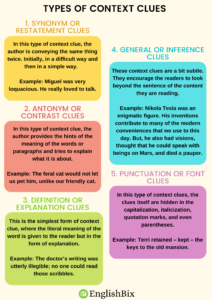While reading some novel or article, we sometimes come across a text or para that is quite confusing or we do not what exactly is going on.
What are Context Clues?
Context clues are basically the hints for specific content – to understand the meaning of the content that is hidden in the plain yet twisted text. Context clues can be used to explain a passage, paragraph, or individual statements.
With the help of context clues, we can essential information about the phrases or words that are used in the content. This directly or indirectly helps the reader to understand the meaning of the paragraph. Moreover, the context clues provide insights into the specific portion of the text that is generally difficult to understand. Sometimes even the title of a piece or the illustrations that come with it offers context clues, as well. These clues are really beneficial in learning the meaning of unfamiliar words in a unique way.
When You Should Use Context Clues?
We now know that context clues are very valuable tools which provide assistance in understanding the contextual writing. You can make use of context clues while reading some articles, or novels or some news clipping.
Let’s have a look at 5 different types of context clues and use them in sentences.
1. Synonym or Restatement Clues
In this type of context clue, the author is conveying the same thing twice. Initially, in a difficult way and then in a simple way. This can often happen in the same sentence itself. In case you do not understand a particular word then you just keep reading it one or more times to understand the flow of the sentence.
Sentence Example
- Miguel was very loquacious. He really loved to talk.
- The rambunctious kids ran out to the bus and climbed on board. They jumped and yelled and just couldn’t settle down.
- It was a frigid winter night; even the lake was frozen solid.
2. Antonym or Contrast Clues
In this type of context clue, the author provides the hints of the meaning of the words or paragraphs and tries to explain what it is about. Generally, the word “but” will be used in the sentence that will show the opposite thought and how it is presented.
Sentence Example:
- This painting of the landscape is picturesque, while one of the old houses is just plain ugly.
- The feral cat would not let us pet him, unlike our friendly cat.
3. Definition or Explanation Clues
This is the simplest form of context clue, where the literal meaning of the word is given to the reader but in the form of explanation. Sometimes the author will add very specific words to tell us an explanation is upcoming. These can include phrases like “which means” or “that is” or “in other words.”
Sentence Example:
- The dates are listed in chronological order; they start at the beginning and end with the last event.
- The doctor’s writing was utterly illegible; no one could read those scribbles.
4. General or Inference clues
These context clues are a bit subtle. They encourage the readers to look beyond the sentence of the content they are reading.
Sentence Example:
- Nikola Tesla was an enigmatic figure. His inventions contribute to many of the modern conveniences that we use to this day. But, he also had visions, thought that he could speak with beings on Mars, and died a pauper.
5. Punctuation or Font clues
In this type of context clues, the clues itself are hidden in the capitalization, italicization, quotation marks, and even parentheses. With these, you can understand that the clues tell the reader that the word could be a name, a book title, or even the word is being defined for us.
Sentence Example:
- Terri retained – kept – the keys to the old mansion.
- The ancient clock only rang once in a millennium (a thousand years).
we hope that this quick guide gave you a detailed overview on different types of context clues with their sentence examples.

Stay tuned to EnglishBix for more resources.
Quick Links

